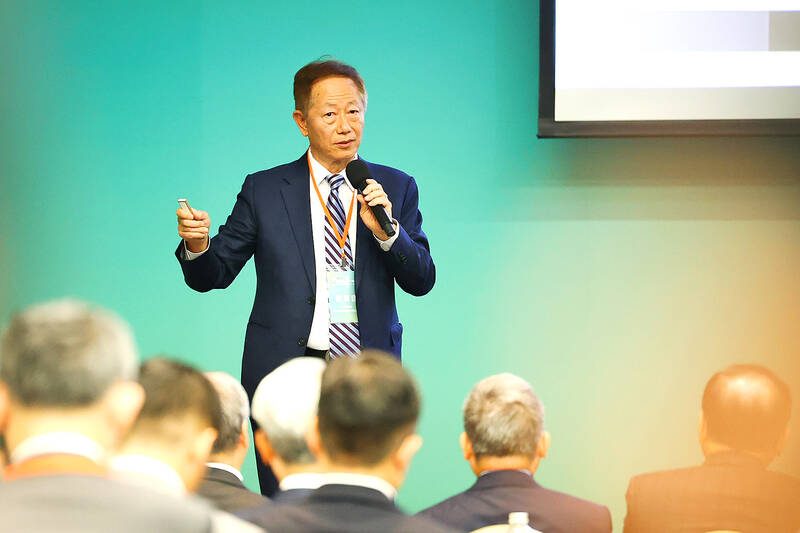Former Taiwan Semiconductor Manufacturing Co (TSMC, 台積電) chairman Mark Liu (劉德音) yesterday warned against the tendency to label stakeholders as either “pro-China” or “pro-US,” calling such rigid thinking a “trap” that could impede policy discussions.
Liu, an adviser to the Cabinet’s Economic Development Committee, made the comments in his keynote speech at the committee’s first advisers’ meeting.
Speaking in front of Premier Cho Jung-tai (卓榮泰), National Development Council (NDC) Minister Paul Liu (劉鏡清) and other officials, Liu urged the public to be wary of falling into the “trap” of categorizing people involved in discussions into either the “pro-China” or “pro-US” camp.

Photo: CNA
Liu, who stepped down in June after six years as TSMC chairman, did not mention specific instances, saying only that this tendency would hinder “imagination” and “curiosity” in discussions.
He cited the US as an example and said policy discussions had been dominated by either the “pro-Trump” or “anti-Trump” camp — referring to former US president Donald Trump, who is seeking a return to the White House in this year’s election — often seeking to prioritize its agenda above all else.
Instead, he called for the elimination of binary thinking and for bringing together every stakeholder in society to help “make Taiwan strong.”
Taiwan needs to scramble to confront its economic disadvantages, particularly its limited market size, he said.
If a company does not see the entire world as a potential market, it will sooner or later find itself “confined” to the domestic market, Liu said.
While such a business strategy might still make company executives wealthy, its positive impact on Taiwan’s economy might not be long-lasting, he said.
“Taiwan needs to identify opportunities where it can contribute to global market growth,” Liu said, adding that Taiwan’s next key industry would be determined by whether it has the potential to become a global supplier.
With that in mind, the government must focus its resources on developing and supporting “ecosystems” for industries where Taiwan has a competitive advantage in producing high-value-added goods to help capture the global market, he said.
Liu specifically mentioned the boom in the data center industry, which he described as “a gift suddenly falling from the sky,” likely alluding to recent plans by foreign tech giants, including Google, Amazon Web Services and Nvidia Corp, to build such centers in Taiwan.
Taiwan has to seize the opportunity to develop the “cooling system,” a critical part of a data center, he said, adding that having an edge in that realm would make Taiwan indispensable to the global community.
Established in July, the Executive Yuan’s Economic Development Committee has been described by Cho as a task force responsible for formulating policies and addressing various economic issues.
Apart from Liu, the commission includes nearly 60 representatives from enterprises, business associations and academia who serve as advisers.

With an approval rating of just two percent, Peruvian President Dina Boluarte might be the world’s most unpopular leader, according to pollsters. Protests greeted her rise to power 29 months ago, and have marked her entire term — joined by assorted scandals, investigations, controversies and a surge in gang violence. The 63-year-old is the target of a dozen probes, including for her alleged failure to declare gifts of luxury jewels and watches, a scandal inevitably dubbed “Rolexgate.” She is also under the microscope for a two-week undeclared absence for nose surgery — which she insists was medical, not cosmetic — and is

CAUTIOUS RECOVERY: While the manufacturing sector returned to growth amid the US-China trade truce, firms remain wary as uncertainty clouds the outlook, the CIER said The local manufacturing sector returned to expansion last month, as the official purchasing managers’ index (PMI) rose 2.1 points to 51.0, driven by a temporary easing in US-China trade tensions, the Chung-Hua Institution for Economic Research (CIER, 中華經濟研究院) said yesterday. The PMI gauges the health of the manufacturing industry, with readings above 50 indicating expansion and those below 50 signaling contraction. “Firms are not as pessimistic as they were in April, but they remain far from optimistic,” CIER president Lien Hsien-ming (連賢明) said at a news conference. The full impact of US tariff decisions is unlikely to become clear until later this month

GROWING CONCERN: Some senior Trump administration officials opposed the UAE expansion over fears that another TSMC project could jeopardize its US investment Taiwan Semiconductor Manufacturing Co (TSMC, 台積電) is evaluating building an advanced production facility in the United Arab Emirates (UAE) and has discussed the possibility with officials in US President Donald Trump’s administration, people familiar with the matter said, in a potentially major bet on the Middle East that would only come to fruition with Washington’s approval. The company has had multiple meetings in the past few months with US Special Envoy to the Middle East Steve Witkoff and officials from MGX, an influential investment vehicle overseen by the UAE president’s brother, the people said. The conversations are a continuation of talks that

CHIP DUTIES: TSMC said it voiced its concerns to Washington about tariffs, telling the US commerce department that it wants ‘fair treatment’ to protect its competitiveness Taiwan Semiconductor Manufacturing Co (TSMC, 台積電) yesterday reiterated robust business prospects for this year as strong artificial intelligence (AI) chip demand from Nvidia Corp and other customers would absorb the impacts of US tariffs. “The impact of tariffs would be indirect, as the custom tax is the importers’ responsibility, not the exporters,” TSMC chairman and chief executive officer C.C. Wei (魏哲家) said at the chipmaker’s annual shareholders’ meeting in Hsinchu City. TSMC’s business could be affected if people become reluctant to buy electronics due to inflated prices, Wei said. In addition, the chipmaker has voiced its concern to the US Department of Commerce